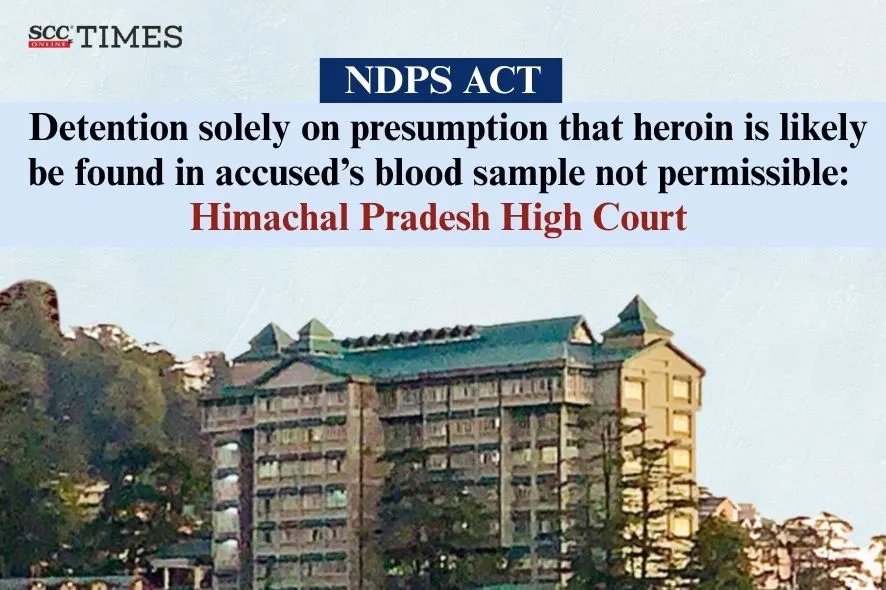Himachal Pradesh High Court: The petitioner filed the present petition seeking regular bail in a first information report (‘FIR’) registered for the offences under Sections 21 and 29 of the Narcotic Drugs and Psychotropic Substances Act, 1985 (‘NDPS Act’), for being present when the police recovered narcotics from the co-accused’s house. A Single Judge Bench of Rakesh Kainthla, J., while granting bail to the petitioner, observed that the police must connect the person with the commission of a crime before his detention could be justified and thus, a person could not be detained solely on the assumption that some incriminating substance would be found against him.
Background:
On 08-07-2025, the police, while on patrolling duty, received a credible information at 04:45 p.m., that two people were selling heroin from their house and if search was conducted, a huge quantity of heroin could be recovered. It was reduced to writing and sent to the Supervisory Officer. The police went to the house where one of the suspects and the petitioner were present. Upon searching the house, a burnt currency note of Rs 10 kept under the mattress, a bundle of currency notes worth Rs 44,000 and a pouch containing 45.350 grams of heroin was recovered. The police arrested the suspect and the petitioner. The substance was sent to FSL, and the report was awaited. The petitioner and the co-accused revealed during the interrogation that they were heroin addicts and used to purchase it from a supplier who could not be located.
The petitioner’s counsel submitted that the recovery was affected from the house owned by the co-accused and the petitioner was only a casual visitor, and he had not been connected to the commission of crime. He relied upon this Court’s judgment in Shubham Bitalu v. State of H.P., 2020 SCC OnLine HP 293, wherein it was laid down that “mere presence in the house, without other evidence implicating the petitioners, or pointing out that they were regular visitors to the said house, would entitle them to a grant of bail”.
However, the Additional Advocate General submitted that the police had taken the blood samples of the petitioner and the co-accused and sent them to FSL for analysis, the result of which was still awaited. The petitioner also had criminal antecedents as an FIR was already registered against him. It was further contended that the petitioner was found in possession of heroin and would indulge in the commission of a similar offence if he was released on bail.
Analysis and Decision:
The Court referred to Ajwar v. Waseem, (2024) 10 SCC 768, wherein the Supreme Court held that “while considering whether bail ought to be granted in a matter involving a serious criminal offence, the Court must consider relevant factors like the nature of the accusations made against the accused, the manner in which the crime was alleged to have been committed, the gravity of the offence, the role attributed to the accused, the criminal antecedents of the accused, the probability of tampering of the witnesses and repeating the offence, if the accused were released on bail, the likelihood of the accused being unavailable in the event bail was granted, the possibility of obstructing the proceedings and evading the courts of justice and the overall desirability of releasing the accused on bail”. This position was reiterated in Ramratan v. State of M.P., 2024 SCC OnLine SC 3068, and Shabeen Ahmad v. State of U.P., (2025) 4 SCC 172.
The Court noted that there was nothing to connect the petitioner with the commission of the crime except his visit to the house and relied on Shubham Bitalu (supra) wherein it was held that a casual visitor to the home could not, prima facie, be attributed with the knowledge of the presence of narcotics kept inside the house.
The Court in relation to the prosecution’s heavy reliance upon the statement made by the petitioner and the co-accused that they had purchased the heroin for their self-consumption from a supplier, referred to Surinder Kumar Khanna v. Directorate of Revenue Intelligence, (2018) 8 SCC 271, where the Supreme Court had observed that a confession made by a co-accused could not be taken as a substantive piece of evidence against another co-accused and could only be utilized to lend assurance to the other evidence. Subsequently, in Tofan Singh v. State of T.N., (2021) 4 SCC 1, the Supreme Court held that a confession made to a police officer during the investigation was hit by Section 25 of the Evidence Act, 1872, and was not saved by the provisions of Section 67 of the NDPS Act. Thus, the Court concluded that no advantage could be derived by the prosecution from the confessional statement made by the co-accused implicating the petitioner.
Further, the Court stated that it was difficult to appreciate the submission that the blood sample sent to the FSL was likely to indicate the presence of heroin. The Court opined that the police must connect the person with the commission of a crime before his detention could be justified and it was impermissible to detain the petitioner in custody on mere presumption of presence of heroin in the blood sample. Regarding the petitioner’s criminal antecedents, the Court observed that they would have been relevant if the prosecution had established a prima facie case against the petitioner and since such a case was not made out, the petitioner could not be detained in custody based on mere criminal antecedents.
Consequently, the Court allowed the petition and ordered the petitioner to be released on bail, subject to his furnishing bail bonds in the sum of Rs 1,00,000 with one surety of the like amount.
[Mahesh Thakur v. State of H.P., 2025 SCC OnLine HP 3441, decided on 29-07-2025]
Advocates who appeared in this case:
For the Petitioner: Peeyush Verma, Senior Advocate, with Anuj Bali, Advocate.
For the Respondent: Jitender Sharma, Additional Advocate General.


